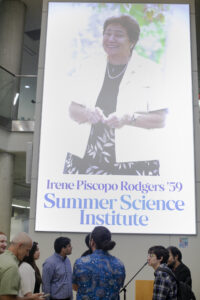The University of Mary Washington’s Summer Science Institute (SSI) has given UMW students the chance to conduct trailblazing undergraduate STEM research – analyzing cancer cells, carbon dioxide reduction, and complex computer coding – for a quarter of a century.

Many of these young scientists had access to their summer studies because of the scholarships, research fellowships, and scientific presentation grants funded by Irene Piscopo Rodgers ’59. UMW named the program the Irene Piscopo Rodgers ’59 Summer Science Institute at a ceremony in the Hurley Convergence Center lobby during SSI’s annual symposium on Wednesday.
“Irene had a long history of supporting STEM majors in pursuing their passion through research,” said College of Arts and Sciences Dean Keith Mellinger, who outlined the history of SSI and recognized the more than 500 students who have participated in research with UMW faculty since its inception. The transformational $30 million estate gift she left the University has resulted in noticeable growth for the program, especially in the last couple of years, he said, from 14 students in the late 1990s to 30 students this summer. “And this trajectory will continue. More faculty, more students, more projects, more lives changed.”
Before Board of Visitors Rector Devon Williams Cushman ’93 read the board resolution, Dean Mellinger thanked Professor Emeritus of Chemistry Ray Scott, who attended the ceremony, for securing the original grant from DuPont and launching SSI. “The program has a history of setting students up for success in graduate and professional study, as well as a seamless entry into any number of careers,” Dean Mellinger said.
Since 1999, SSI’s 10-week program has offered undergraduate students the opportunity to work closely alongside their professors and peers, now in the areas of biology, chemistry, physics, computer science, mathematics, and Earth and environmental science. Funding from generous donors, as well as the Naval Surface Warfare Center, Dahlgren Division, has helped these students engage in extensive research on a broad range of topics across disciplines.
At the symposium, participants summarized their findings through oral presentations and poster sessions, providing solutions for real-world concerns such as preventing breast cancer cell proliferation and exploring how environmental pollutants impact aquatic life. Other projects delved into dark matter, studied skeletal muscle function, explored how to make computers more efficient, and mined data to understand nationwide teaching shortages and demographic changes over time.

Morgan Hicok ’25 and Kate Green ’25, who both studied freshwater snails, earned top prizes. Joseph Gasink ’26, who researched the impact of trace metals on aquatic life, and Boone Fleenor ’26, who studied how drones can impact water circulation, were selected as runners-up. All received awards through the John C. and Jerri Barden Perkins ’61 College of Arts and Sciences Student Research Endowment, which provides funding for them to continue their studies during the academic year.
Dr. Jerri Barden Perkins earned a bachelor’s degree in chemistry at Mary Washington and a medical degree from the Medical College of Virginia. She conducted groundbreaking research on rheumatoid arthritis at the National Institutes of Health and reviewed clinical data at the U.S. Food and Drug Administration to protect patients in clinical trials.
“We’re so grateful to both of these women, Dr. Perkins and Irene, for their extraordinary philanthropy and dedication to advancing scientific education and research,” said Vice President for Advancement and Alumni Engagement Katie Turcotte. “Their stories of being women in male-dominated fields and overcoming obstacles to find success have and will continue to profoundly inspire our undergraduate students and faculty in their own pursuit of scientific knowledge.”
Irene Piscopo Rodgers earned a bachelor’s degree in chemistry from Mary Washington, followed by a master’s degree in chemistry from the University of Michigan. She became a revered electron microscopist, working at the American Cyanamid Company and Philips Electronic Instruments.
As one of the few women her profession, she helped pave the way for current UMW students, especially women, to excel in STEM subjects of their own choosing. To date, more than 100 students have benefited from her generosity. In 2004, Irene donated a transmission electron microscope to UMW, teaching students and faculty how to use it. A decade later, the University awarded her an honorary Doctor of Humane Letters degree for her service and contributions to the institution. Her estate gift also helped establish four new full-ride Alvey Scholarships for out-of-state students, in addition to eight she created during her lifetime.
Learn more about the College of Arts and Sciences’ Irene Piscopo Rodgers ’59 Summer Science Institute.
– Article by Assistant Director of Advancement Communications Jill Graziano Laiacona ’04




Leave a Reply